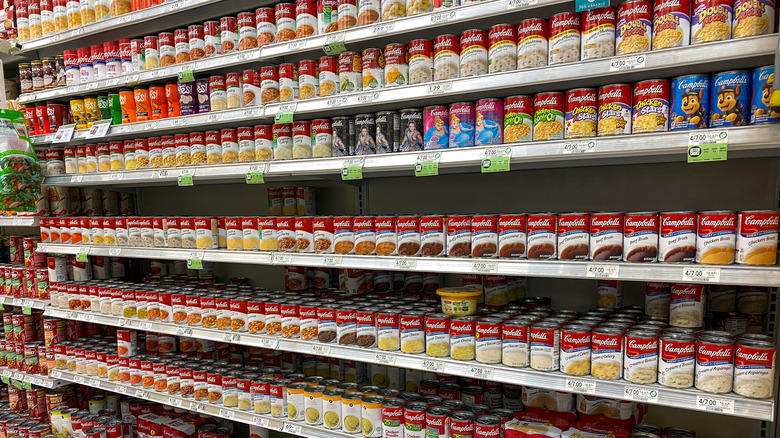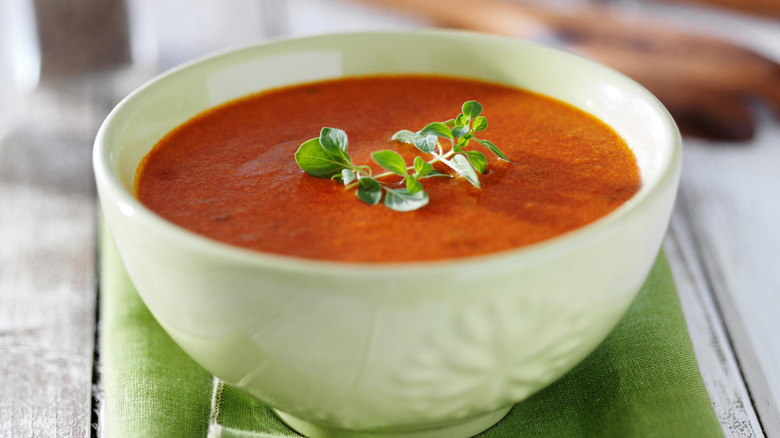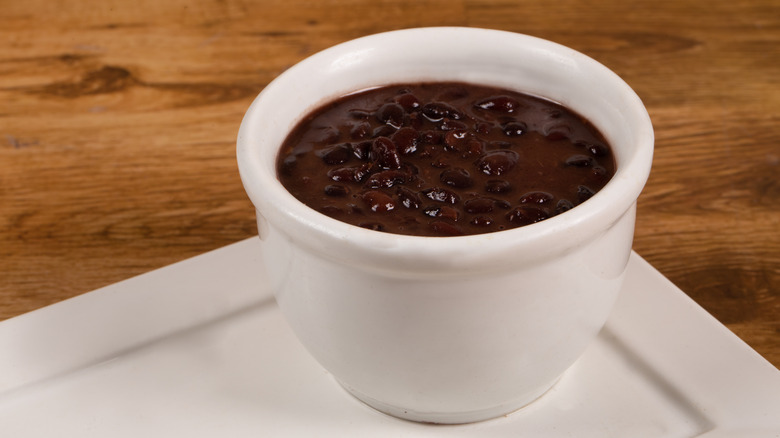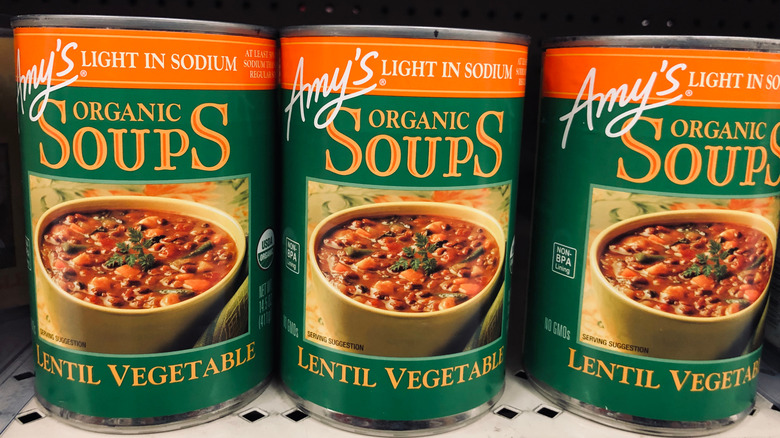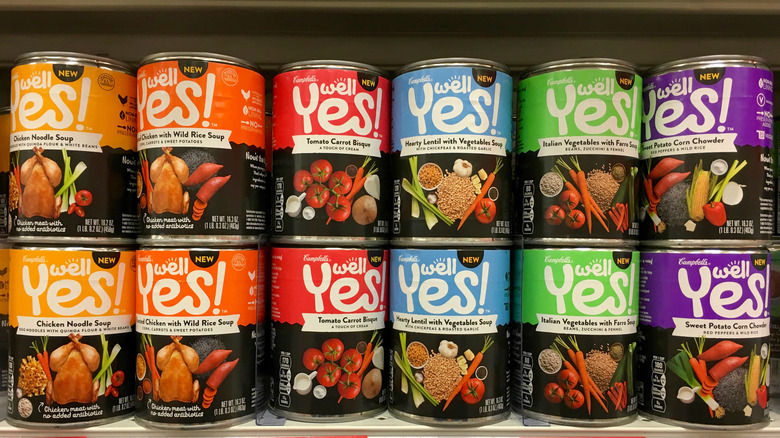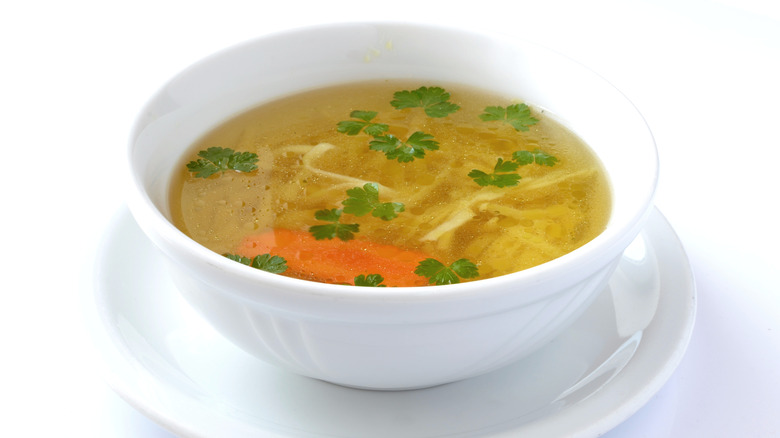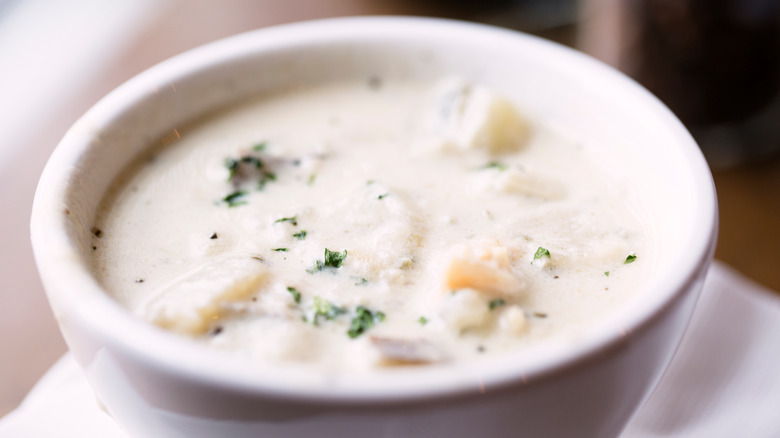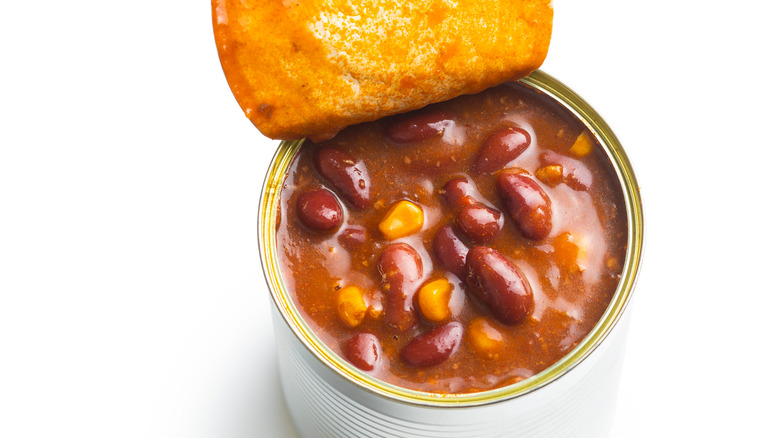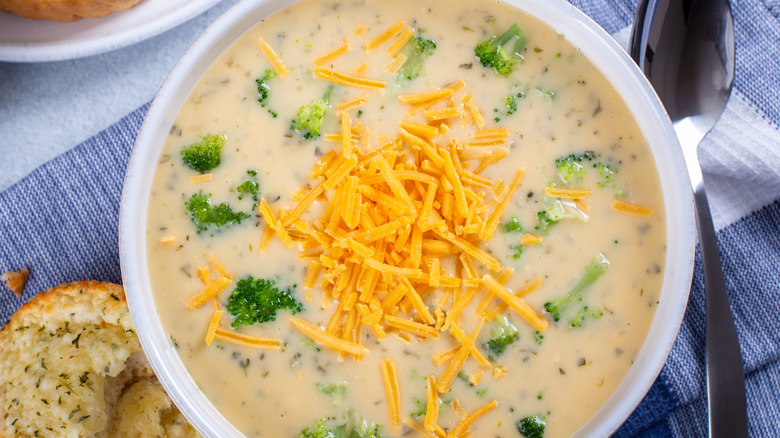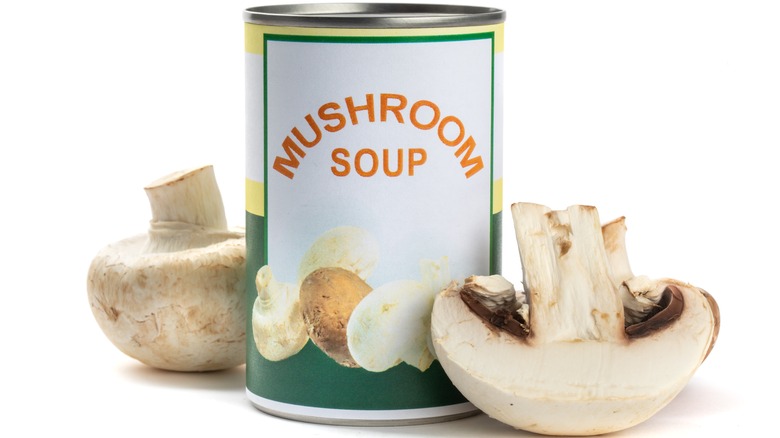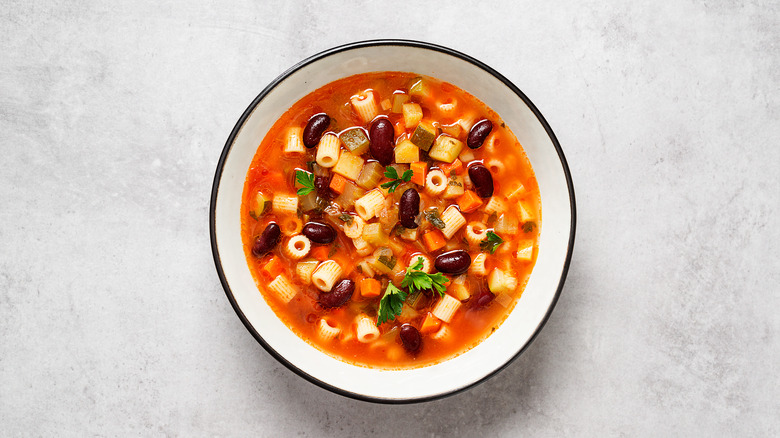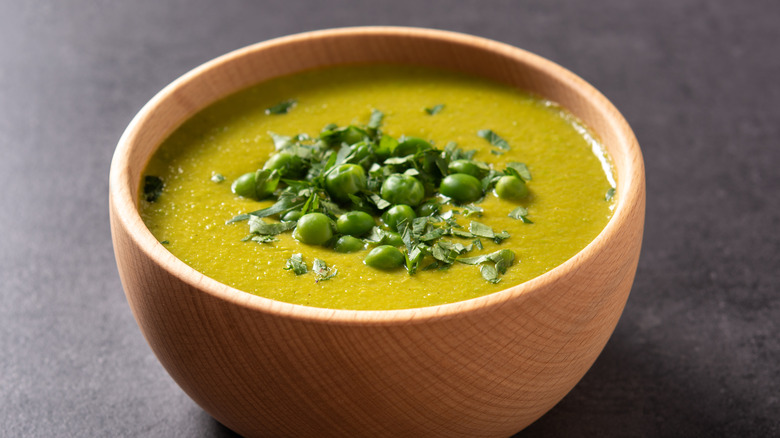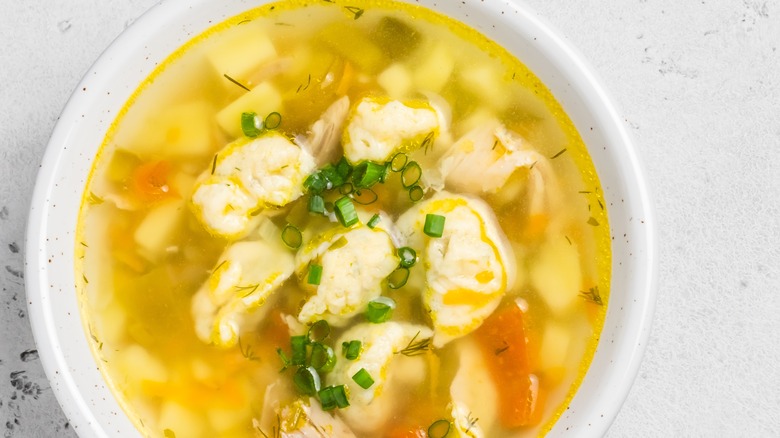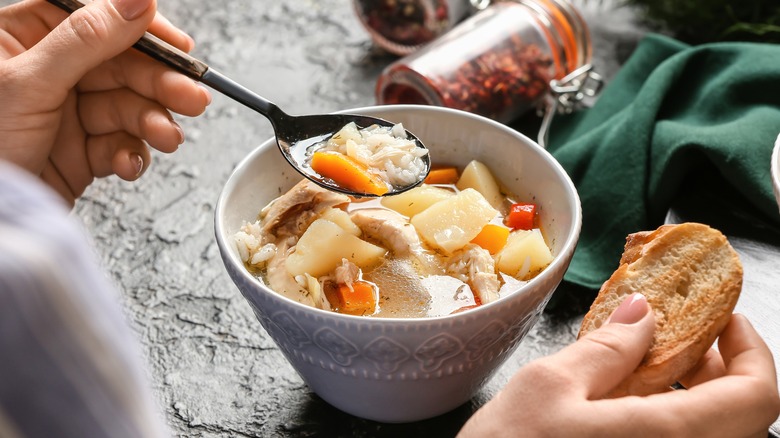Canned Soups You Should And Shouldn't Buy
It's soup season — the perfect time to warm up with a tasty cup of soup! But soup doesn't have to be homemade to be enjoyable; canned soups have many benefits including convenience. Since they're shelf-stable, you can keep them in the pantry for a long time, and then when you're ready, open one for a satisfying appetizer or meal. According to Healthline, people who eat soup have better hydration, eat more vegetables, and consume a good amount of fiber, which aids in digestion.
But before you open a can of your favorite broth, chowder, or bisque, ask yourself if this soup is really a good choice. Here's why: Canned soups are often loaded with sodium, extra fat, and calories. Healthline warns canned soups use a lot of thickeners — like corn starch, heavy cream, egg yolks, and full-fat milk — which can be problematic due to the added calories and saturated fats, the latter of which can be linked to heart disease.
Canned soups are often packed with salt, which can lead to elevated blood pressure, a risk factor for kidney and heart disease. "The biggest thing to be mindful of with canned food is sodium," Elizabeth DeRobertis, RD, director of the Nutrition Center at the Scarsdale Medical Group/White Plains Hospital told Consumer Reports. "Some canned soups can contain over 1,000 milligrams in a single serving." That's why it's best to choose soups labeled low or reduced sodium. Read on for a breakdown of the types of canned soups you should and shouldn't buy.
Buy tomato soups
One of the best canned soups you should be buying is tomato soup. That's because tomatoes are rich in lycopene, which Healthline says is an antioxidant that has many health benefits Including fighting off the development of chronic diseases like diabetes and heart disease. Lycopene, an antioxidant that gives tomatoes their red color, may also protect the immune system, and can lower the risk of developing some cancers.
Plus, tomatoes taste great and give lots of flavor to your soup. Clean Plates conducted a tomato soup taste test and chose their favorite good-for-you tomato soups. Its picks? Amy's organic chunky tomato bisque light in sodium, which it says is bursting with tomato flavor and doesn't taste under-seasoned, despite having reduced salt; and Wolfgang Puck's organic tomato basil bisque, which it says "tastes the closest to homemade." Both soups are organic. Clean Plates also recommends Pacific Food's organic creamy tomato soup, noting it's rich in protein and potassium and doesn't have too many added sugars. Whatever canned tomato soup you choose, enjoy it with a classic pairing: grilled cheese.
Buy black bean soups
When you think of canned soups, you may think of beans as an added ingredient, not as the main ingredient. But black beans have main character energy when you're eating black bean soup. And for good reason — they are full of fiber, which can boost your heart health and digestive health. They're also great sources of magnesium and iron.
Fooducate, a free mobile app to help Americans learn about their food, ranks Goya's black bean soup an A-, saying the particular pros are that the canned soup has 120 calories per serving and less than 1/2 teaspoon of added sugar. It also gave Trader Joe's Latin-style black bean soup, (which is in a tetra pack container and not a can), an A-, explaining the soup has 80 calories per serving and is a top product in its category. However, both soups are high in salt, as are many other canned soups.
Buy lentil soups
Lentils are a powerhouse in your soup. They're packed with proteins, fiber, calcium, iron, potassium, folate, and more (via WebMD). When The Good Housekeeping Nutrition Lab nutritionists evaluated store-bought soups, they included Amy's light in sodium lentil soup on the best healthy canned soup list for 2022. This lentil soup has half the salt of the original, plus it's a great source of fiber and protein without added sugar. It's also 100% vegan and organic.
The same soup is a top pick for culinary expert Ligia Lugo, a recipe developer and co-founder of the Daring Kitchen, who told New York Magazine's The Strategist, "My husband and I always have a few cans of this in our pantry." Fooducate gives Amy's light in sodium lentil soup an A-. It gives the same ranking to two other top canned lentil soups: Progresso Soup's lentil with vegetables and Health Valley's organic no salt added lentil soup.
Buy vegetable soups
The American Heart Association says adults should be eating five servings of vegetables a day such as corn, carrots, potatoes, broccoli, and bell peppers. These veggies and others are often available in canned soup.
Registered dietician nutritionist Chelsey Amer told HuffPost she likes Campbell's Well Yes! soups. "I'm a big fan of these soups because they're an easy way to eat more veggies," Amer said. "If your pantry is stocked, you'll always have veggies available even if you're running low on groceries."
Good Housekeeping also likes Campbell's Well Yes! lightly salted vegetable noodle soup, as well as the Health Valley canned organic minestrone soup, which has lots of veggies including organic peas, organic spinach, organic tomatoes, organic celery, organic carrots, and more. Health Valley organic vegetable soup, which is also loaded with organic veggies, is another soup to consider. Fooducate states it's a top product in the category and gave it an A-.
Buy chicken soups
Chicken soup is the standard feel-good, taste-good soup when you're not feeling well or just want some cozy, comfort food. One study found it has an anti-inflammatory effect, which may help you feel better when you're sick (via Chest Journal). Still, not all canned chicken soups are the same. Just as with other varieties of soup, chicken soups can be high in salt and fat, so pay attention to the nutritional information.
For its list of top canned soups, Good Housekeeping nutritionists included Pacific Foods organic southwest style chicken tortilla soup, citing its yummy flavor, and praising it for being dairy-free, packed with protein and fiber, and low in calories and fat. Still, according to Fooducate, it is too salty. Campbell's chicken noodle soup is a classic that often tops the list of best canned chicken noodle soups for its addictive umami flavor, while Progresso traditional chicken noodle is another great option that includes chunks of chicken and sliced carrots.
Don't buy creamy chowders
According to Lobster Anywhere, chowder — a stew made with seafood like clams, shrimp, fish, or lobster, and either milk or cream — originated in the early 18th century in England as a hearty meal that used a variety of seafood. Nowadays, it's known as an appetizer or entrée, but it's often not the healthiest soup. Here's why: The creamy base adds a lot of fat and calories to the dish.
For example, Progresso's traditional New England clam chowder has more than 400 calories and nearly 20 grams of fat in an 18.5-ounce can, and its rich & hearty chicken corn chowder has almost 400 calories and 18.5 grams of fat in the same-sized can. However, Progresso's traditional Manhattan clam chowder — which has a tomato base rather than milk or cream — has about 225 calories and only 4.5 grams of fat in a 19-ounce can. By avoiding the cream, you'll have a chowder that's at least a little healthier.
Don't buy bisques
Much like chowder, bisque is known for its creaminess; but that creaminess can come at a price. In an interview with Prevention, Marci Clow, MS, a registered dietitian explained, "Bisque is often thickened with heavy cream contributing saturated fat, but also pureed seafood, which adds a boost of cholesterol."
Eating too much saturated or trans fats can lead to high cholesterol levels (via the Mayo Clinic). A large accumulation of cholesterol can restrict blood flow in the arteries, potentially causing significant health problems, such as heart disease and strokes.
Comparing bisques, it's clear they're not all the same. For example, 1 cup of Whole Foods Market lobster bisque has 20 grams of fat, 13 grams of saturated fat, and ½ gram of trans fats. In comparison, canned vegetable-based bisques seem to be healthier. Campbell's Well Yes! butternut squash bisque has 5 grams of fat, 3 grams of saturated fat, and no trans fat. If you must buy a bisque, then a vegetable variety made without heavy cream is the healthier route.
Be cautious about buying canned chili
Canned chili is often a no-no as well, but again, not all canned chilis are the same. There can be a big range of fat, calories, and sodium in each brand's product. For example, Fooducate rated Wolf Brand chili without beans a C+ because it has over half the daily recommended amounts of sodium and saturated fat. It's also high in cholesterol. The site went on to list the soup as one of the worst products in the chili category.
Registered dietitian and nutritionist Sharon Palmer told HuffPost, "If a serving is more than 20% DV sodium, which is 460 milligrams, it's pretty high." She says Eden chili made with organic black beans, quinoa, and spices is one of her go-to choices, explaining it's not salty and is made with lots of veggies and whole grains. The vegetarian chili is also lower in sodium.
Don't buy broccoli and cheese soups
Broccoli is an excellent source of minerals, vitamins, fiber, and antioxidants, which may have anti-inflammatory properties, per Healthline. But there's a big difference between eating a bowl of steamed broccoli and eating a cup of creamy broccoli and cheese soup: The soup has the addition of saturated fats and sodium.
A 15.5-ounce container of Campbell's Slow Kettle Style Soup creamy broccoli cheddar bisque has 28 grams of fat and 11 grams of saturated fat — that's 55% of the recommended daily amount of saturated fat. The soup also has 1,420 milligrams of salt, which is 62% of the daily recommended amount of sodium. One cup of the Progresso traditional broccoli and cheese soup has 12 grams of fat and 4.5 grams of saturated fat, as well as 880 milligrams of sodium, which is 38% of the daily recommended amount.
With this much saturated fat and sodium in each can, it may be a better idea to make your own so you can control the ingredients. For instance, make a healthier version by swapping out dairy-based milk in your recipe with plant-based milk, such as almond milk, which has no saturated fat.
Don't buy potato soups
Potato soup is another canned soup to skip. As a main ingredient, potatoes do have health benefits. According to WebMD, they are a good source of fiber, potassium, calcium, Vitamin B6, folate, magnesium, and antioxidants. But, as a soup, Healthfully explains, the main downsides are too much salt and preservatives. Potato soups with extra ingredients like bacon or cheese can add additional fat and calories too.
For example, one 15.5-ounce container of Campbell's Slow Kettle Style baked potato soup with Applewood smoked bacon has 430 calories and 30 grams of fat, including 10 grams of saturated fat, which is half of the daily amount of recommended saturated fat. With 1,420 milligrams of sodium, you're already at 62% of the daily recommended amount. The soup also includes MSG, a preservative that is found in many processed foods. While MSG is generally considered safe, it has been shown to overstimulate the appetite; it may also be linked to headaches and fatigue for some people (via the Mayo Clinic).
Don't buy cream of mushroom soups
UCLA Health says mushrooms are low in sodium, rich in vitamin D and vitamin B6, may protect the brain from mild cognitive impairment, and may help your gut health. In soup form, mushrooms are typically seen in cream of mushroom soups, often as the star ingredient in casseroles, not necessarily as an appetizer or entree. Still, you might want to think twice about opening a can of the creamy soup.
Sadly, canned cream of mushroom soup is loaded with salt. Sue Heikkinen, a registered dietitian who works with MyNetDiary, a nutrition app, said, "Sky-high sodium content is the primary nutrient of concern in any canned soup." She says Campbell's cream of mushroom soup has 870 milligrams of sodium per half-cup serving, which represents one-third of the daily salt allowance recommended by the American Heart Association. Heikkinen also said the soup has MSG and isn't gluten-free.
Buy minestrone soup
Stock up on canned minestrone, an Italian vegetable-based soup that often includes tomato, beans, and rice or pasta. Minestrone soup recipes can vary but you can expect beans like cannellini beans, which are packed with protein, folate, iron, and more healthy ingredients (via VeryWellFit).
Consumer Reports advises checking out the label and making sure the soup doesn't have a lot of sodium, but aside from that, minestrone soup is typically a good source of fiber and protein. In their blind taste test of 15 soups, including canned, pouches, refrigerated, and jarred varieties, the magazine identified three as having overall very good quality including Tabatchnick minestrone soup, Trader Joe's organic hearty minestrone soup, and Zuppa Rustica minestrone soup.
Their other picks for minestrone soups with overall good quality include Amy's light in sodium organic minestrone soup, Campbell's condensed minestrone soup, Campbell's Well Yes! minestrone, Health Valley organic minestrone no salt added, Progresso reduced sodium hearty minestrone, and Tabatchnick low sodium minestrone soup.
Buy pea soup
Canned split pea soup is a healthy and tasty soup to have in your pantry. The main ingredient, split peas, are rich in iron, zinc, and protein. Nutrition Facts states that eating peas and other legumes can help you manage health conditions including hypertension, inflammation, pre-diabetes, and cholesterol.
But, as with all soups, you should check the label for sodium levels. A half-cup of Campbell' split pea with ham & bacon condensed soup has 170 calories, 2 grams of fat, 0.5 grams of saturated fat, and 790 milligrams of sodium, which is 34% of the recommended daily value of salt. Note: The can has 2.5 servings so if you can plan to eat the whole thing, that's a lot of salt!
One cup of Pacific Foods organic split pea soup has 160 calories, 2 grams of fat, no saturated fat, and 590 milligrams of sodium. A cup of Amy's organic split pea has 120 calories, 1 gram of fat, no saturated fat, and 720 milligrams of sodium. These pea soups still have quite a bit of sodium so you might consider a low-sodium variety like Amy's organic split pea light in sodium, which has 310 milligrams of sodium, 120 calories, 1 gram of fat, and no saturated fat.
Don't buy chicken and dumpling soup
Chicken and dumpling soup is a classic, Southern comfort food but the nutritional value of some popular canned versions might make you uncomfortable. Unfortunately, the high sodium levels in canned chicken and dumplings soups are typically rather significant. And with high sodium comes a possible increase in blood pressure. One 241-gram serving of Dinty Moore chicken & dumplings, which is about 1 cup, has 200 calories, 7 grams of fat, 2 grams of saturated fat, and 940 milligrams of sodium. Campbell's creamy chicken & dumplings has 170 calories, 10 grams of fat, 2 grams of saturated fat, and 890 milligrams of salt per cup. One cup of the Progresso creamy roasted chicken with herb dumplings has 150 calories, 7 grams of fat, 2 grams of saturated fat, and 680 milligrams of sodium.
Rather than reach for a can at the grocery store, make a healthier version of chicken and dumplings instead. You can reduce the amount of sodium by making your own broth, and omit some of the fat by switching out the heavy cream with plant-based milk.
Buy healthier versions
One of the complaints about healthier soups sold in canned forms, such as low-sodium or low-fat varieties, is that they're lacking flavor since they're missing additives like extra sugars, salt, and preservatives. But there are a lot of ways to boost the flavor of your canned soup, transforming it from bland to delicious.
Upgrading your canned soup is simple and can be done with what you likely have on hand. By adding spices and seasonings to your soup, such as garlic, curry powder, smoked paprika, pepper, and Italian seasoning, and loading it up with veggies like spinach, peppers, onions, or celery, you can turn your lackluster canned soup into something delicious. Another option is to add more protein like beans or tofu. Finish off your soup with a spritz of lemon juice, a splash of red wine vinegar, or some hot sauce for heat and added flavor.
